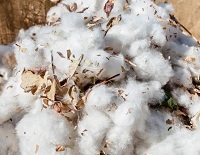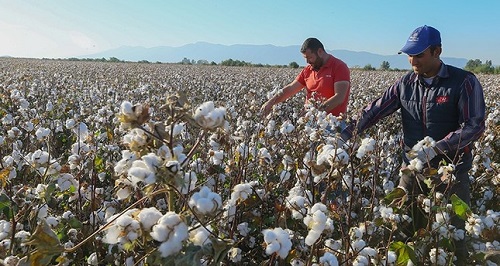"An important link between Europe and Asia, Turkey is a significant exporter of cotton and cotton products to the European Union. The country's textile exporters are known for their fast order response time and higher quality products. Nearly 36,000 companies operate in the sector. The EU remains the leading market for Turkish textiles and garment exporters due to its geographical proximity, short response time and good quality products."
 An important link between Europe and Asia, Turkey is a significant exporter of cotton and cotton products to the European Union. The country's textile exporters are known for their fast order response time and higher quality products. Nearly 36,000 companies operate in the sector. The EU remains the leading market for Turkish textiles and garment exporters due to its geographical proximity, short response time and good quality products.
An important link between Europe and Asia, Turkey is a significant exporter of cotton and cotton products to the European Union. The country's textile exporters are known for their fast order response time and higher quality products. Nearly 36,000 companies operate in the sector. The EU remains the leading market for Turkish textiles and garment exporters due to its geographical proximity, short response time and good quality products.
The three major cotton growing areas in Turkey include the Aegean, Çukurova and GAP regions. The country also produces small amounts of cotton around Antalya. The cotton grown in the Aegean region is recognised as one of the best in terms of quality and is also referred to by textile producers. Though this cotton has more staple length than the cotton grown in either Çukurova or the GAP (1 1/8") region, its quality has improved significantly due to improved seed quality.
Excessive rains, untimely fumigation affects cotton yield
Both the total area under cotton plantation and production for MY 2018–19 declined to 525,000 hectare and 806,000 metric tonne respectively in 2018. Yields were affected due to excessive rains, which necessitated replanting, cool weather during the season and untimely fumigation with stimulated pest attacks in cotton-growing regions.
due to excessive rains, which necessitated replanting, cool weather during the season and untimely fumigation with stimulated pest attacks in cotton-growing regions.
Heavy rains during the picking season affected yield in the Southeastern Anatolia (GAP) region. In addition, increase in prices of fertilisers and other chemical is likely to force farmers to reduce their usage of these inputs in the coming season. It may further affect the yields in the region.
In MY 2019-20, the total area under cotton plantation area and production in the country is expected to further reduce to 540,000 hectare and 893,000 metric tonne respectively. However, cotton growers in the GAP region had no alternative to planting cotton this season as the field conditions in the country are not suitable for planting any other crop.
Government policies to boost production
To boost cotton production, the Turkish government has introduced a number of policies including:
• GAP (Guneydoğu Anadolu Projesi/Southeastern Anatolian Project) Initiative: Through this initiative, the government has invested $25 billion over the past three decades in dam construction, irrigation channels and other infrastructure initiatives. It has also provided technical and financial assistance to farmers to build modern drip irrigation systems to prevent ecological problems and waste of water resources.
• The government has carried out studies on the shift from open canal irrigation systems to closed systems and is trying to implement and develop sustainable farming practices as a part of the Better Cotton Initiative.
• The Turkish government had promoted cotton production by giving a bonus for five years in a row until MY 2017-18 and retained it for MY 2018–19.
• Cotton import faces zero import tax in the country. Turkish importers do not need to pay the 3 percent import tax if they are exporting the materials produced from the imported cotton. But US cotton is subjected to a 3 per cent anti-dumping duty (since April 2016).
• Turkey has issued a new taxation directive on imported cotton yarn in order to support imports from countries such as Turkmenistan, India and Pakistan, which are the major cotton yarn suppliers to the nation.
• Turkish importers of cotton yarn do not require to pay tax if they export the product made with the same imported cotton yarn. Turkey is a major consumer of cotton and faces impediments in domestic cotton production. Hence, Turkey will continue to import cotton for years to come.












